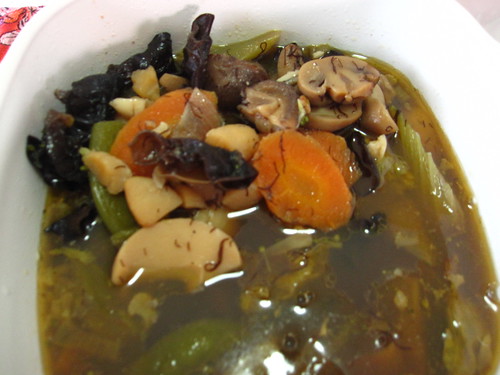 |
| Facai fungus in a vegetarian dish often seen during Chinese new Year. |
Facai, a fungus which looks like hair and which is traditionally eaten during Chinese new year because 'facai' sounds like 'gaining prosperity' (發財), is actually a type of toxic bacteria called nostoc flagelliforme.
Over-harvesting has led to China banning the fungus, and most facai today is actually made from starch. One 2009 study in Amyotrophic Lateral Sclerosis found that few samples of facai on sale were actually genuine nostoc flagelliforme, with the genuine ones containing the toxin beta-N-methylamino-L-alanine (BMAA).
BMAA has been implicated in nerve-related diseases such as motor neuron disease or amyotrophic lateral sclerosis, the disease highlighted by the ice bucket challenge; in Alzheimer’s disease as well as in Parkinson’s disease. A 2013 study in PLOS One explains that the body may mistake BMAA for a very similar amino acid that it uses called serine, leading to abnormalities in nerve tissue.
BMAA has definitely caused brain disorders in mice. A 2011 study in Behavioural Brain Research noted that high doses of BMAA injected into adult rats caused "distinct deficits in spatial learning and memory" but it wreaks most of its damage in developing fetuses. An earlier study by the same researchers published in Toxicological Sciences studied adult rats which had been exposed to BMAA as babies. These rats displayed learning impairments as adults, for example in not associating a punishment as a disincentive.
While there seems to be a case for avoiding facai, or rather the BMAA it contains, BMAA is not only found in facai. It can be found in plants, in water, and likely accumulated in the food chain as live seafood eats materials which contain BMAA and are themselves eaten.
Where does that leave the health-conscious consumer? How much BMAA is too much? The research is still scanty and until we know more about whether we should be avoiding BMAA and how we can do it, we can always err on the side of caution through avoiding foods which are known to contain BMAA.